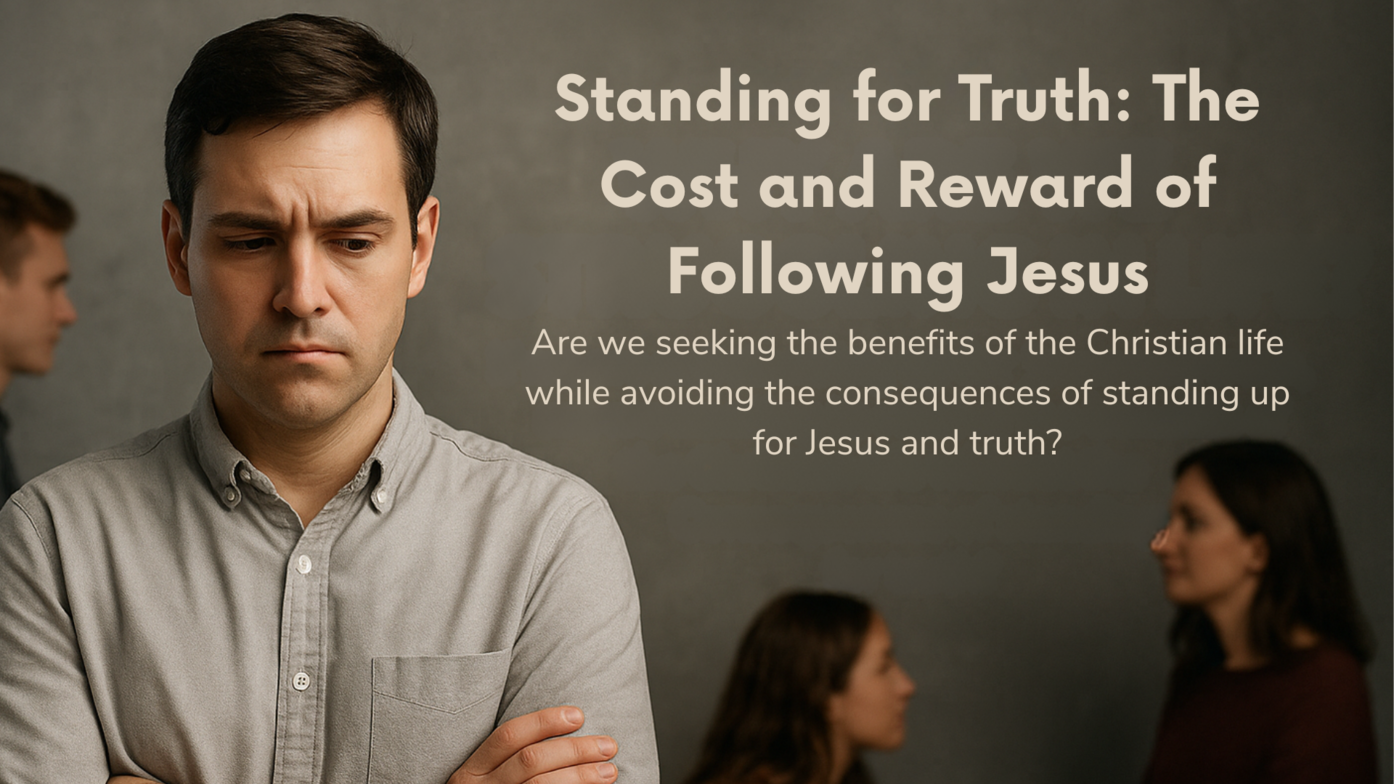Standing for Truth:


We all want a life filled with peace, blessing, and joy — but what if our struggles are actually revealing something deeper?
Many of us love the benefits of following Jesus — forgiveness, grace, eternal life — but we often shy away from the consequences of standing for truth. The Christian life was never meant to be comfortable. In fact, Jesus warned us that following Him would put us at odds with the world.
Matthew 10:32-33 reminds us:
“So everyone who acknowledges me before men, I also will acknowledge before my Father who is in heaven, but whoever denies me before men, I also will deny before my Father who is in heaven.”
This isn’t just a verse for first-century disciples — it’s a challenge for us today.
The Real Struggle
When we don’t stand up for Jesus, we often end up living a divided life — one foot in faith, one foot in comfort. This split is exhausting. We want the peace of God, but we also want the approval of people. We want the rewards of heaven but fear the rejection of earth.
No wonder we struggle! Our soul knows we’re meant for more.
Why Standing for Truth Matters
Standing for Jesus doesn’t just honor Him — it strengthens you. Each time you speak truth, your faith grows bolder. Each time you resist compromise, your soul grows stronger.
Yes, it may cost you comfort. Yes, it may cost you relationships. But the reward is eternal.
James 1:12 promises:
“Blessed is the one who perseveres under trial because, having stood the test, that person will receive the crown of life that the Lord has promised to those who love him.”
Practical Ways to Stand for Truth
Here are a few simple ways to start living this out right now:
-
Start Small: Pray in public before your meal. Post a Scripture on social media. Speak kindly when others gossip.
-
Know the Word: The more you know God’s Word, the more courage you’ll have to speak it when it matters.
-
Choose Courage Over Comfort: Next time you’re faced with a tough choice — ask, “What would honor Jesus most?” not “What’s easiest?”
-
Find Your People: Surround yourself with believers who will encourage you to keep going when it’s tough.
Reflection Questions
-
Are there areas in my life where I’ve stayed silent to avoid discomfort?
-
What “truth moments” has God put in front of me recently?
-
What might it cost me to stand for Jesus — and am I willing to pay that price?
A Closing Challenge
Jesus stood for you on the cross when it cost Him everything. Will you stand for Him when it costs you something?
Standing for truth may bring temporary struggle — but it also brings lasting peace, eternal rewards, and the joy of knowing you’ve honored the One who gave everything for you.
Call to Action
If this message spoke to you, take one small step this week: speak truth in love, even if it feels uncomfortable. Then share your experience with a trusted friend or your Bible study group — your courage might inspire theirs.
Note:
Charlie Kirk: An Example of Living By These Standards
Charlie Kirk was known as a bold conservative activist who repeatedly took public stands on issues of faith, culture, and politics—often when doing so was unpopular or risky. Here are a few ways he exemplified “standing for truth”:
-
Public Confession and Identity
Kirk didn’t hide his Christian faith. He helped found Turning Point Faith, a branch of his organization that explicitly connected faith and political/cultural engagement. He often framed his political activism as rooted in Christian doctrine and values. -
Taking Risks and Speaking Boldly Despite Opposition
Throughout his life, he was frequently in the public eye, engaging in debates, challenging prevailing cultural narratives, and speaking in places where many disagreed with him. He used media, campus events, and public forums to stand for what he believed—even when critics accused him of being divisive. -
Maintaining Conviction Even Under Pressure
Especially in his later years, the merging of faith identity with his activism meant higher stakes: social criticism, political pushback, personal attacks. He accepted those pressures rather than stepping back or hiding. Many who followed him see his life as a demonstration of perseverance—holding to his beliefs even when it "cost" him in reputation, opposition, or personal burden. -
Encouraging Others to Do the Same
Kirk didn’t just try to live out his own convictions—he encouraged others, especially young people, to do likewise. To “prove him wrong” tables on college campuses, to debates, to public activism—these were meant not just to win arguments but to equip others to speak truth courageously.